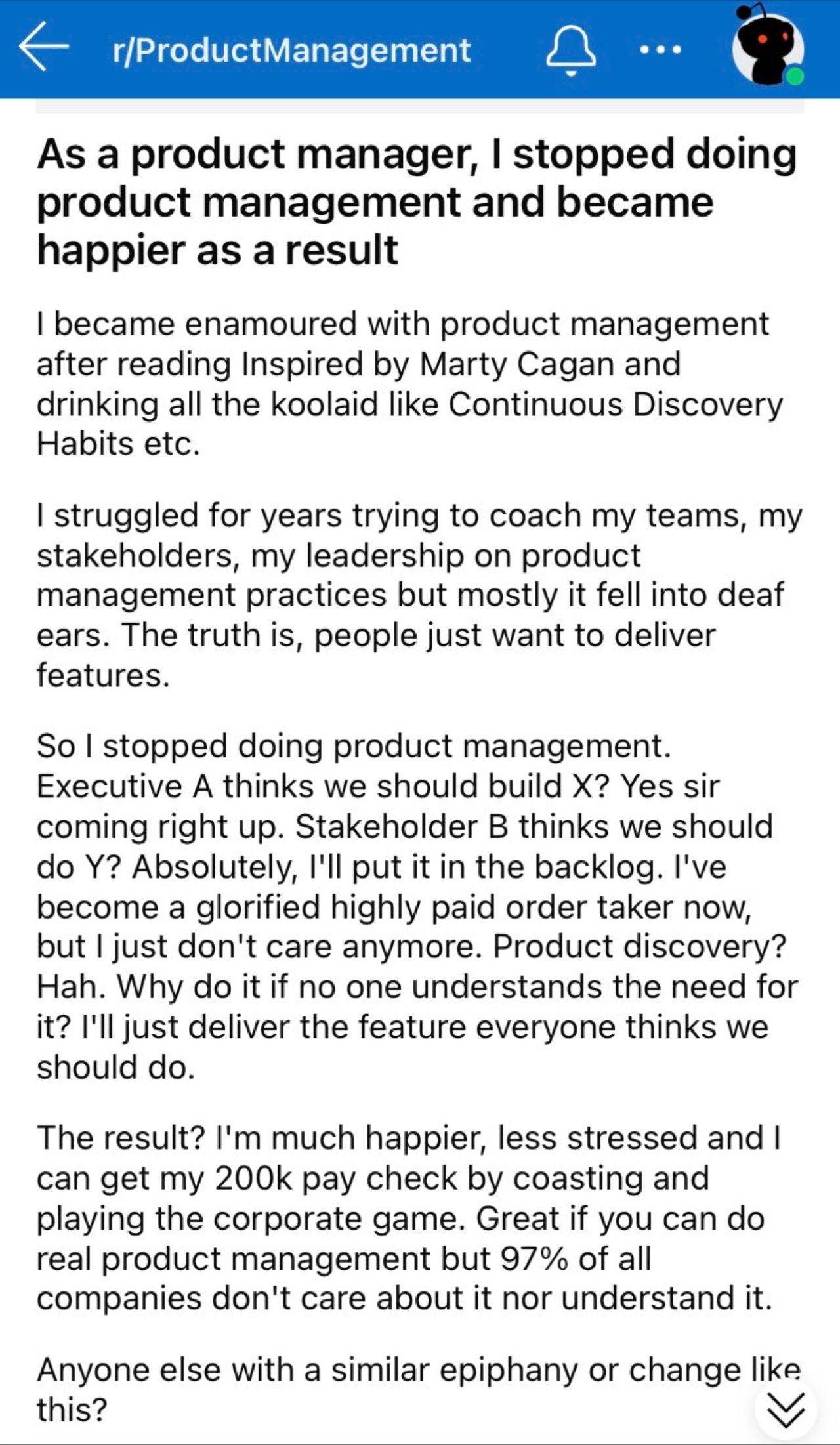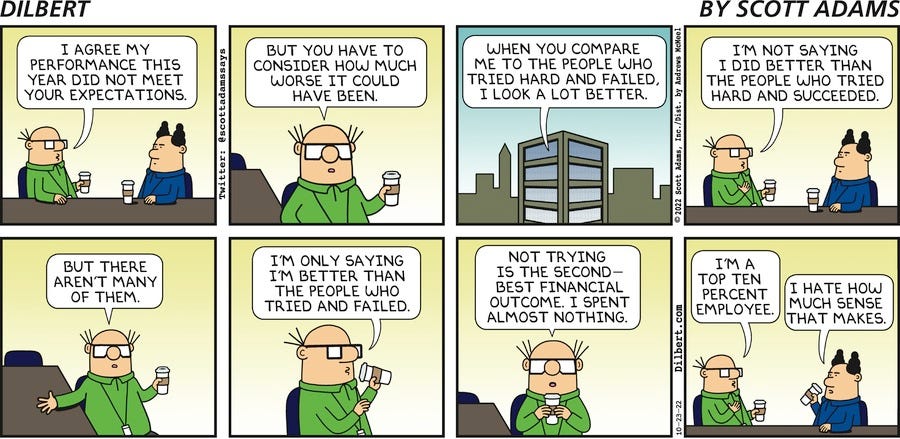Welcome to Polymathic Being, a place to explore counterintuitive insights across multiple domains. These essays take common topics and investigate them from different perspectives and disciplines to come up with unique insights and solutions.
Today's topic gets into something that is not only counterintuitive but really frustrating for so many people. It’s the behaviors, over and over, that everyone says they don’t want, but keep doing, and keep getting rewarded for, while so many, who try to break the cycle, are penalized. It’s the paradox of the successfully unsuccessful.
Intro
So who are the successfully unsuccessful? I’m sure you’ve seen them, worked with them, and been out-promoted by them. They are the ones who match Einstein’s definition of insanity:1
“Insanity is doing the same thing over and over and expecting different results.”
We’ve all been there:
A product or initiative collapses from poor programmatics, a retrospective is completed, a good corrective action is defined and then they kick off the next product or initiative and are convinced that this time it is different, unique, or somehow doesn’t need the corrective action or the good programmatics.
Or the feature that is pushed out with no market analysis, doesn’t sell, and needs massive re-engineering but the next time they just do the same thing again.
Or the innovation project that falls victim to the Three Leadership Fallacies of failing to provide leadership, energy to improve the process, and accountability to sustain and yet manages to convince everyone that it will work this time.
Or the software we start coding before we have a design just to develop a proof of concept but without the design, the proof of concept will never be able to scale.
Or the production manager I met who openly said that he didn’t want any help improving the factory he just took over. His plan was to let the performance slip for the first six months since he could blame the previous guy. Then he planned to let it fester for six months because he could pass it off as ‘learning the ropes.’ Finally, in the third six months, he’d institute improvements to bring it back to where he picked it up. Because at the end of 2 years he’d get promoted because of the improvements he led. (and this actually happened, and he did get promoted)
Or this one here:

It’s the paradox of the successfully unsuccessful. Those people who continue to do the same thing over and over, never really succeeding, yet are able to go home, proud of the work they do, and are still rewarded for it. So how does this behavior continue to be rewarded?
Successfully Unsuccessful.
Fundamentally I don’t have an answer. So this will be an open discussion into what on earth is going on. At the base, it is a multi-variate problem. It’s not one behavior, one personality type, or one circumstance. It’s not even malicious 99% of the time. While I was doing process improvement and product optimization at a previous company a phrase we used a lot was that “We were successful in spite of ourselves.” We’d look around and see easy fixes being overlooked, non-existent process discipline, active workarounds, and a general veneer of apathy. Yet we continued to plod forward, resist change, and let process improvements fade back into previous levels of performance.
This situation really isn’t motivating, especially for the aspiring Polymath, because it seems so myopic, so self-defeating, and so boring! I mean, it’s akin to snatching defeat from the jaws of victory because the wins in front of so many people are so easy to achieve and yet they overlook them!
Fundamentally, as I’ve been recently pondering this, I’m realizing I’ve touched on quite a few of these topics in essays already. It’s a combination of industrious leadership, the leadership fallacies, a band-aid cover-up mindset, and a culture that suppresses divergent mindsets. Is it any wonder why people are quiet quitting? Because clearly, it’s not about real success per se, but how it gets perceived.
What Do We Do?
I think the first step is to realize that we aren’t crazy when we see this and can’t make heads or tails of it. It really does exist and it’s been known for quite some time as we have numerous writings and observations across the years.
A case in point is the book Putt's Law and the Successful Technocrat: How to Win in the Information Age, first published in 1981 which proposes Putt's Law and Putt's Corollary
Putt's Law: "Technology is dominated by two types of people, those who understand what they do not manage and those who manage what they do not understand."
Putt's Corollary: "Every technical hierarchy, in time, develops a competence inversion." with incompetence being "flushed out of the lower levels" of a technocratic hierarchy, ensuring that technically competent people remain directly in charge of the actual technology while those without technical competence move into management
Another is the 1969 book The Peter Principle which states that people in a hierarchy tend to rise to "a level of respective incompetence"
And then there are three decades of Dilbert Cartoons:
The causes are varied and there aren’t prescriptive solutions to this. Foundationally any solution needs to recognize that if an organization allows the successfully unsuccessful, it’s going to take a lot more work than a process improvement as you’ll have to address the organizational behaviors first and primarily. We also need to apply Hanlon’s Razor: "never attribute to malice that which is adequately explained by stupidity." I’d even downgrade stupidity to apathy:
"Never attribute to malice that which is adequately explained by apathy."
Yet within this apathy is a strong defensive mechanism to avoid identification and improvement. Just as I explored in Lazy Leadership, when we were monitoring all of the manufacturing programs in crisis and developed a complexity score, based on the Green Circle, Blue Square, Black Diamond approach to ski-hill difficulty, the measure was quashed and buried because the implications were too damning to those in charge. We ran face-first into the successfully unsuccessful and the last thing they wanted was to be found out.
Summary
My personality type doesn’t really allow me to do this very well. It probably has to do with the Intuitive and Judging coupled with some disagreeableness. I’d rather not do something at all than be successfully unsuccessful. The challenge is that not everyone is like me, and a surprising number (enough to support Putt’s Law, the Peter Principle, and 33 years, and counting, of Dilbert Cartoons) seem to be completely OK with being successfully unsuccessful. In fact, maybe they don’t fall into Einstein’s definition of insanity at all! Maybe they are getting exactly the results they are hoping for because they are successful.
There are things we can do about it though. I’ve addressed and will continue to address techniques to break this paradigm. But right now I’ll leave it at identifying a counterintuitive concept, naming it, and opening up the discussion to see what your thoughts on the topic are:
What’s your best story about the successfully unsuccessful?
How have you successfully worked with it?
What other insights do you have?
Please leave a comment below and I’d love the keep the conversation going!
Or, like almost all quotes, one that is attributed to Einstein because we like giving famous people more credit.








There are two types of people who work for others. Type one is the person who genuinely wants to do some things, to be productive and innovative, and to legitimately solve problems.
The other type of person gets promoted. That type of person focuses not on doing the right things, but instead on jumping through the right hoops. It's a code you can crack if you really want to, the way to get away with being a lazy pile of dookie.
That being said, the very best performers in the corporate world are those who are able to navigate between both areas. I do think you will find some successful folks who only pretend (the 2nd type of person), but I don't think the majority of the VERY successful folks (let's just say VP level or above at an average big company) aren't faking anything, they just have that 2nd skill set as well.
Some links that might be interesting:
https://profilebooks.com/work/the-stupidity-paradox/
https://podcast.livetilesglobal.com/podcast/the-unintelligent-organisation/
https://youtu.be/oCw47L4tWok
“We were successful in spite of ourselves.”
This is the key quote. Most large, successful organisations are stable (which is different to being optimal). This means that it’s hard to fatally break them and also that it’s hard to materially improve them.
What do you think of the Cynefin framework?